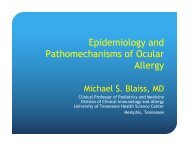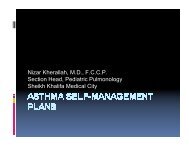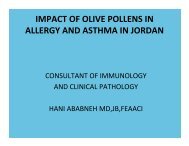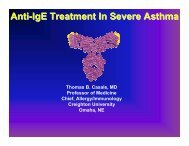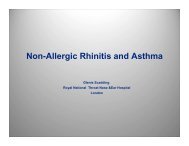Dubai Final-v20.indd - World Allergy Organization
Dubai Final-v20.indd - World Allergy Organization
Dubai Final-v20.indd - World Allergy Organization
You also want an ePaper? Increase the reach of your titles
YUMPU automatically turns print PDFs into web optimized ePapers that Google loves.
ABstrACts<br />
2301<br />
EFFECT oF a SYnBioTiC miXTUrE on aToPiC DErmaTiTiS in CHilDrEn: a ranDomiZED-ConTrollED Trial<br />
Ahanchian, ii, H. 1 , Farid, r. 2 , Jabbari, F. 2 and moghiman, t. 2<br />
1 2 Pediatric <strong>Allergy</strong> and immunology, mashhad University of medical sciences, mashhad, iran. mashhad University of medical<br />
sciences, mashhad, iran.<br />
Background: Atopic dermatitis (AD) is the most common chronic relapsing skin disease seen in infancy and childhood. the<br />
intestinal microbiota plays an important role in immune development and may play a role in the development of allergic disorders.<br />
manipulation of the intestinal microbiota by synbiotics may therefore offer an approach to the prevention or treatment of allergic<br />
diseases.<br />
objective: We studied the clinical and immunologic effects of a new symbiotic(a mixture of seven probiotic strains of bacteria and<br />
Fructooligosaccharide) in infants and children with AD.<br />
method: in a randomized, double-blind, placebo-controlled study, 40 infants and children aged 3months to 6 years with AD<br />
received either a synbiotic or placebo for 8 weeks. the severity scoring of Atopic Dermatitis (sCOrAD) index was recorded at<br />
baseline and also at 4 and 8 weeks of treatment..<br />
results: the synbiotic group showed a significantly greater reduction in sCOrAD than did the placebo group (P= 0.001).no specific<br />
effect was demonstrated of the probiotics employed on cytokine profile.<br />
Conclusion: this study provides evidence that a mixture of seven strains of probiotics and Fructooligosaccharide can clinically<br />
improve the severity of AD in young children. Further studies are needed to investigate the effects on underlying immune responses<br />
and the potential long term benefits for patients with AD.<br />
Keywords: Atopic Dermatitis, synbiotic, Cytokine, Children<br />
2302<br />
EFFiCaCY oF omaliZUmaB monoTHEraPY in THE managEmEnT oF aToPiC DErmaTiTiS<br />
syrigou, E. 1 , sinaniotis, A. 1 , Paraskevopoulos, J. 2 and Psarros, P. 3<br />
1 2 Department of <strong>Allergy</strong>, “sotiria” general Hospital, Athens, greece. Department of <strong>Allergy</strong>, 401 Army Hospital, Athens, greece.<br />
3Department of <strong>Allergy</strong>, naval Hospital, Athens, greece.<br />
Background:Omalizumab is a unique biological therapeutic drug licensed for the treatment of atopic patients with moderate to<br />
severe persistent allergic asthma with a serum igE ranging from 30 to 700 iU/ml. this study was performed to examine the efficacy<br />
of omalizumab for the treatment of atopic dermatitis, a disease with significant morbidity.<br />
methods:We report the case of three young Caucasian men (16, 18 and 24 years old) who presented with chronic severe atopic<br />
dermatitis that only responded to oral corticosteroids. Failed treatments for these patients included topical corticosteroids,<br />
topical tacrolimus, oral prednisone, oral antibiotics and oral antihistamines. Only oral corticosteroids provided significant relief.<br />
All three patients had also moderate to severe persistent allergic asthma. All three patients had increased serum immunoglobulin<br />
E (igE) levels: 532 iU/ml, 11.860iU/ml and 13.340iU/ml respectively (reference range, 11-210 iU/ml). All three patients received<br />
omalizumab a humanized monoclonal anti-igE antibody currently indicated for patients 12 years and older with moderate to severe<br />
persistent asthma, administered suncutaneously, in a total dose of 450mg every 15 days. Atopic dermatitis severity was assessed<br />
at 0, 1, 3, 6 months with sCOrAD.<br />
results:All the three patients responded to a 12-week course of omalizumab, with significant improvement of their atopic<br />
dermatitis symptoms. no adverse events were reported throughout the course of treatment.<br />
Conclusion:We suggest that omalizumab may have a role in the treatment of atopic dermatitis in the adult population and further<br />
studies are needed to establish its therapeutic effect.<br />
2303<br />
EFFECTiVEnESS oF omaliZUmaB in THE TrEaTmEnT oF ColD UrTiCaria<br />
sinaniotis, A. 1 , Psarros, P. 2 , Paraskevopoulos, g. 3 and syrigou, E. 1<br />
1 2 Department of <strong>Allergy</strong>, “sotiria” general Hospital, Athens, greece. Department of <strong>Allergy</strong>, Athens naval Hospital, Athens, greece.<br />
3Department of <strong>Allergy</strong>, 401 Army Hospital, Athens, greece.<br />
Background: the effectiveness of the humanized monoclonal antibody omalizumab in the treatment of physical urticaria has been<br />
demonstrated by a number of small studies and case reports. in this case study we sought to assess the effects of omalizumab in<br />
www.worldallergy.org 133<br />
FinAl PrOgrAm<br />
ABstrACts









